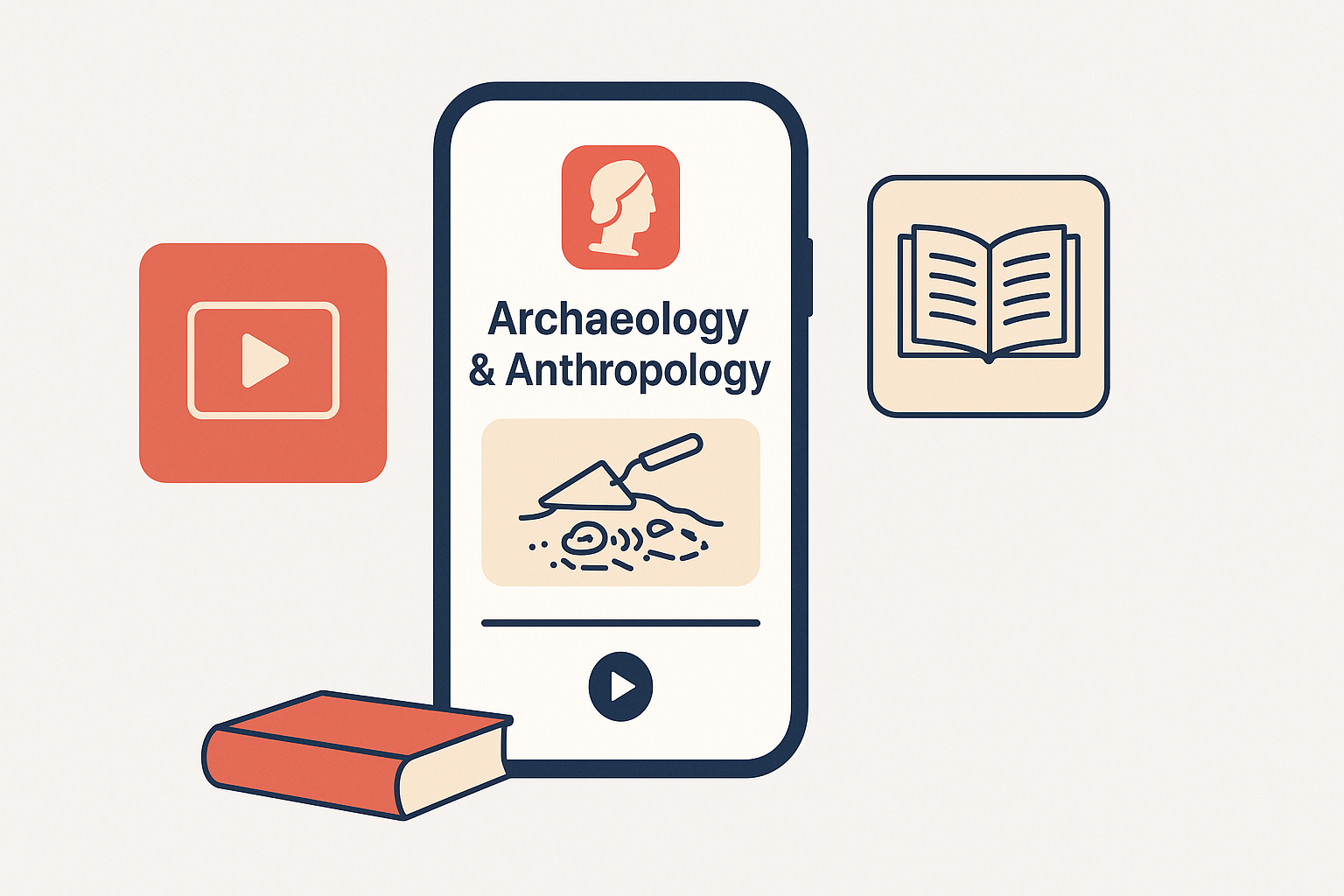Best Archaeology & Anthropology Learning Apps with Audiorista

For students, educators, and institutions interested in archaeology learning apps and anthropology education platforms, the most pressing challenges are often the same. Creating engaging multimedia lessons requires combining video, audio, and text resources in a way that’s both easy to distribute and simple to access. At the same time, no one wants to wrestle with technical complexity or spend months building apps from scratch.
Audiorista solves these challenges with a no-code platform designed for educational publishers, researchers, and universities. With support for video lectures, podcast-style interviews, and structured reading materials, Audiorista makes it simple to deliver interactive lessons, virtual field studies, and curated cultural archives. In this guide, we’ll explore how archaeology and anthropology lessons can be turned into engaging, mobile-first education apps, and why this approach benefits both students and institutions.
Archaeology and anthropology learning benefits
An archaeology learning app provides a streamlined way to distribute field lectures, historical case studies, primary source readings, and curated archives in one accessible location. Instead of separating resources across different systems or formats, educators can centralize content into a mobile app where everything is available on-demand.
Students increasingly expect flexible learning options that adapt to their schedules, whether they’re studying from a classroom, a library, or in the field. An app format meets this need by providing continuous access on a device students already use daily. By combining multimedia content into a unified platform, archaeology learning apps help institutions maintain consistent access to cultural materials and improve the learning experience.
Anthropology courses often rely on diverse content types, from ethnographies and interviews to podcasts and academic articles. Delivering these materials in a traditional learning management system can feel restrictive, particularly when dealing with multimedia research and long-form cultural studies.
With Audiorista, professors, universities, and independent researchers can deliver curated anthropology courses as full-featured education platforms. Audio interviews can sit alongside lecture recordings, while digitized ethnographies and research notes can be structured into easily navigable course modules. This makes complex cultural studies accessible as a single, cohesive student resource, without requiring technical development effort from faculty.
Practical applications of no-code course apps
One of the most effective ways to teach archaeology is through immersive, interactive content. However, producing such interactive lessons often requires custom technical work—unless educators use a no-code platform like Audiorista.
With Audiorista, educators can create video walkthroughs of excavation sites, build interactive artifact analysis modules, and add scholarly text commentary to complement multimedia materials. These resources can be combined into structured courses directly inside the app without coding or system integrations. This simplicity ensures professors and researchers can concentrate on delivering rich educational content while keeping the technical experience seamless for students.
Students using anthropology learning apps are often focused on three essential features: structured flow, mobile accessibility, and flexible access options such as subscriptions. An effective education app should guide learners through a logical course progression while still making it easy for them to revisit specific lectures or research archives when they need to.
Examples of valuable anthropology resources delivered through apps include digital field training guides or mobile-accessible cultural study archives. When packaged in app form, these resources allow students to learn on the go, whether preparing for fieldwork or reviewing case material for exams. For students, the ideal app combines content access with flexibility, making sure they can engage with materials in ways that fit their schedule and learning style.
Institutions and educational media creators are increasingly turning to Audiorista to create virtual archaeology and anthropology lessons that simulate real-world learning experiences. Through digitized archives, video walkthroughs of historical sites, and interactive cultural modules, students can gain exposure to materials that might otherwise be locked behind physical barriers.
This model enhances accessibility and helps ensure preservation of cultural content while expanding reach to students in remote locations. For educators interested in incorporating field experiences into digital teaching, Audiorista provides tools to design lessons that translate into immersive mobile-first interactions. To learn more, explore how educators use Audiorista to deliver rich, multimedia classroom experiences through apps.
Developing an academic course app often feels out of reach for institutions without in-house developers. Audiorista restructures this process with a no-code platform built specifically for course delivery. Professors can organize lessons into branded modules, place video and audio content alongside assigned readings, and manage courses through a streamlined interface that prioritizes student experience.
These branded course apps make it simple to distribute programs that reflect the institution’s identity and teaching goals. Structured academic flows keep content organized, while mobile-first design ensures students always have access. To see a breakdown of how straightforward this setup can be, see how easy app creation works with Audiorista’s intuitive builder.
Final thoughts
Archaeology and anthropology thrive on rich, multimedia storytelling — from field recordings and excavation walkthroughs to cultural archives and scholarly texts. With Audiorista, educators and institutions can bring these resources together in a single mobile platform that is accessible, immersive, and easy to manage. By removing technical barriers, Audiorista enables professors, researchers, and universities to focus on what matters most: delivering meaningful cultural education that engages students anywhere, anytime. For learners, this creates flexible access to curated knowledge; for educators, it provides a scalable way to preserve and share expertise in a modern, mobile-first format.
Start building your archaeology or anthropology learning app today with Audiorista—no coding required, just powerful publishing tools for video, audio, and text.


